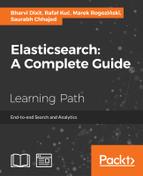Until now, you have seen the execution of a single get request to fetch a document and hit a single query at a time to search for documents. However, life will be easier with the following two APIs offered by Elasticsearch.
Multi get is all about combining more than one get request in a single request. I remember once I had a requirement to check the existence of multiple documents in an index and create a bulk update request against only those IDs that did not already exist. The one way to do this was by hitting a single HEAD request for each document ID, and based on the response of Elasticsearch, create a bulk update request for the documents that did not exist. However, multi get requests can solve this problem in a single API call instead of multiple HEAD requests.
All you need to do is create an array of document IDs and hit them on Elasticsearch using the _mget endpoint of Elasticsearch. The following is a simple curl request to show how you can do this:
curl 'localhost:9200/index_name/doc_type/_mget' -d '{
"ids" : ["1", "2"]
}'Here, IDs are the _id of the documents to be fetched.
You have additional options to decide whether you want to return the data of the document or not. If it is not required, just set _source : false while hitting the mget request. For example:
curl 'localhost:9200/index_name/doc_type/_mget' -d '{
"ids" : ["1", "2"], "_source" : false
}'If you are interested in only returning a particular field, you can do it like this:
curl 'localhost:9200/index_name/doc_type/_mget' -d '{
"ids" : ["1", "2"], "_source" : ["field1", "field2"]
}Here, field1 and field2 are the names of the fields required to be returned.
Python example:
Declare an array of IDs to be fetched:
document_ids_to_get = ['1','4','12','54','123','543']
Create a query by passing an array of doc IDs to the ID parameter:
query = {"ids": document_ids_to_get}
#Exceute the query using mget endpoint:
exists_resp = es.mget(index=index_name,doc_type=doc_type, body=query, _source=False, request_timeout=100)Java example:
Import the following packages into your source code:
import org.elasticsearch.action.get.MultiGetItemResponse; import org.elasticsearch.action.get.MultiGetResponse;
Create a multi get request in the following way:
MultiGetResponse responses = client.prepareMultiGet()
.add(indexName, docType, ids_to_be_fetched)
.execute().actionGet();The multi get response is parsed in the following way:
for (MultiGetItemResponse itemResponse : responses) {
GetResponse response = itemResponse.getResponse();
if (response.isExists()) {
String json = response.getSourceAsString();
System.out.println(json);
}
}The id_to_be_fetched function is a list of document IDs that need to be fetched.
You might have worked with many databases and search engines, but none of them provides the functionality to hit more than one query in a single request. Elasticsearch can do this with its _msearch REST API. For this, it follows a specific request format as shown here:
header body ……… ……… header body
Understanding the preceding search request structure:
header: This includes the name of the index/indices to be searched upon and optionally includes the search type, search preference nodes (primary, secondary, and so on), and routingbody: This includes the search request queries
Let's see an example:
- Create a file,
multi_requests, with the following content. Please note that each line is separated with{"index" : "users"} {"query" : {"match_all" : {}}, "from" : 0, "size" : 10} {"index" : "twitter", "search_type" : "dfs_query_then_fetch"} {"query" : {"match_all" : {}}} - Now execute the search request using the
_msearchAPI:curl -XGET localhost:9200/_msearch --data-binary "@ multi _requests"
In the preceding
curlcommand, we have used the–data-binaryflag to load the multiline content from the file. This is required while executing bulk data indexing too.Note
Searches executed with the
_msearchAPI return responses in the responses array form, which includes the search response for each search request that matches its order in the originalmulti searchrequest. If there is a complete failure for that specific search request, an object with an error message will be returned in the place of the actual search response.
Python example:
- Create an individual request head with an index name and doc type in the following way:
req_head1 = {'index': index_name1, 'type': doc_type1} - Create a
query_request_arraylist, which contains the actual queries and the head part of those queries:query_request_array = [] query_1 = {"query" : {"match_all" : {}}} query_request_array.append(req_head1) query_request_array.append(query_1) - Create another request with a head and body:
req_head2 = {'index': index_name2, 'type': doc_typ2} query_2 = {"query" : {"match_all" : {}}} query_request_array.append(req_head2) query_request_array.append(query_2) - Execute the request using a
msearchendpoint by passingquery_request_arrayinto the body; you can optionally setrequest_timeouttoo:response = es.msearch(body=query_request_array) - The response of a multi search can be parsed in the following way:
for resp in response["responses"]: if resp.get("hits"): for hit in resp.get("hits").get('hits'): print hit["_source"]
Java example:
- To execute a multi search using Java, you need to import the following packages into your code:
import org.elasticsearch.action.search.MultiSearchResponse; import org.elasticsearch.action.search.SearchRequestBuilder;
- Then, you can create an individual search request using the
SearchRequestBuilderclass:SearchRequestBuilder searchRequest1 = client.prepareSearch().setIndices(indexName).setTypes(docType) .setQuery(QueryBuilders.queryStringQuery("elasticsearch").defaultField("text")).setSize(1); SearchRequestBuilder searchRequest2 = client.prepareSearch().setIndices(indexName).setTypes(docType) .setQuery(QueryBuilders.matchQuery("screen_name", "d_bharvi")).setSize(1); - These individual search requests can be added to a multi search request and executed in the following way:
MultiSearchResponse sr = client.prepareMultiSearch() .add(searchRequest1) .add(searchRequest1) .execute().actionGet(); - You will get all the individual responses from
MultiSearchResponse, as follows:long nbHits = 0; for (MultiSearchResponse.Item item : sr.getResponses()) { SearchResponse response = item.getResponse(); nbHits += response.getHits().getTotalHits(); } }
